Rockets Take Off and Crash and Scatter in the Air
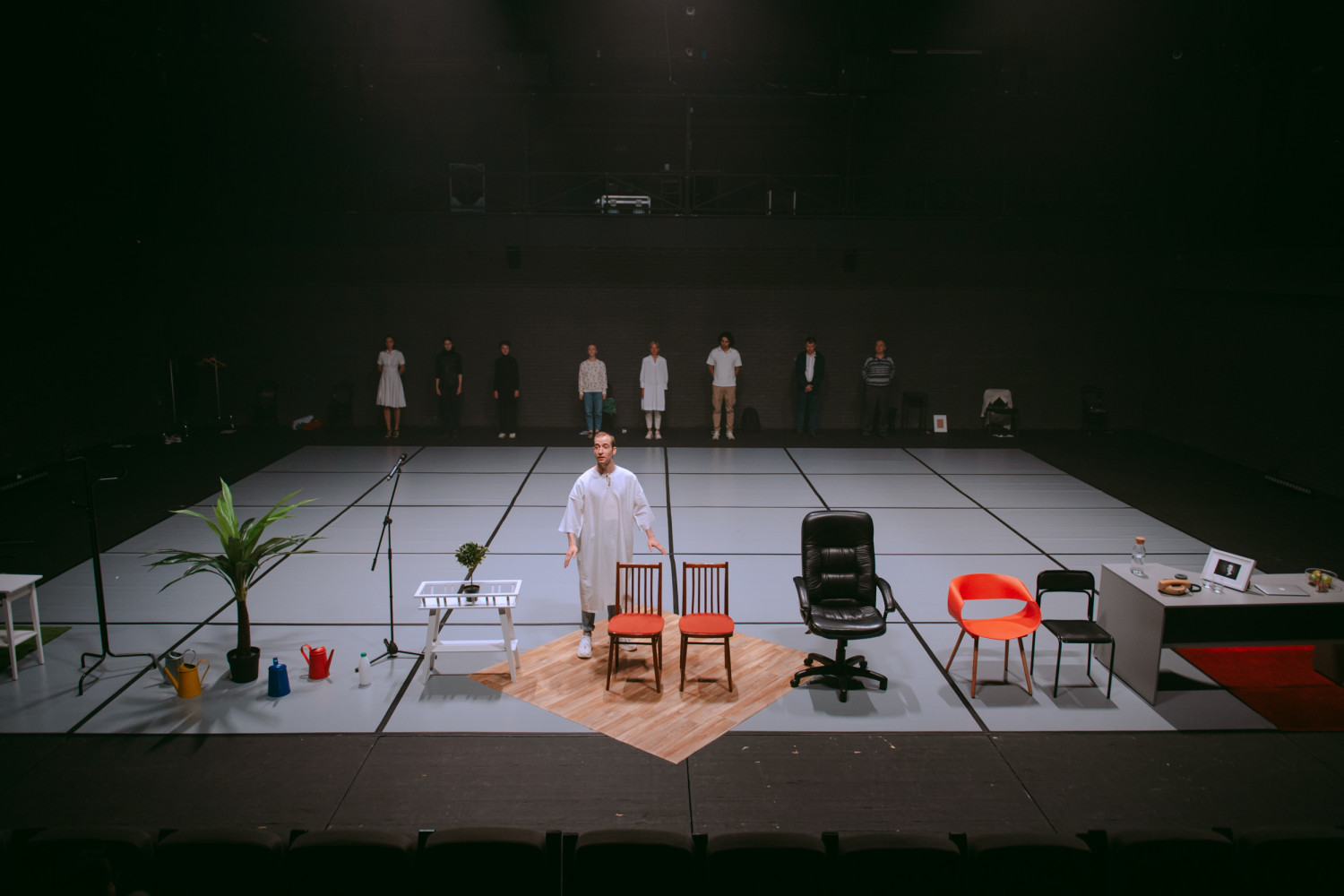
"Rockets Take Off and Crash and Scatter in the Air" is an algorithmic performance created in collaboration with Vanya Demidkin, Artyom Tomilov, and Elina Lebedze.
There are three plays in three different genres, and three mini-performances based on them. Then, we divided each mini-performance into elements and put them into an algorithm that changes the sequence of these pieces for each show, leaving only 70% of each mini-performance at the output.
The text underlying the performance and the music were created from scratch. They are from different times, spaces, and genres because this performance is a constructor, and they are all just fragments of reality that are reassembled every time. The composition of the performance is knowledge; the knowledge not only that everything is connected to everything, but also that even connections are always connected to each other. "Rockets" shows the boundary between theater and performance as practices and methods of representation.
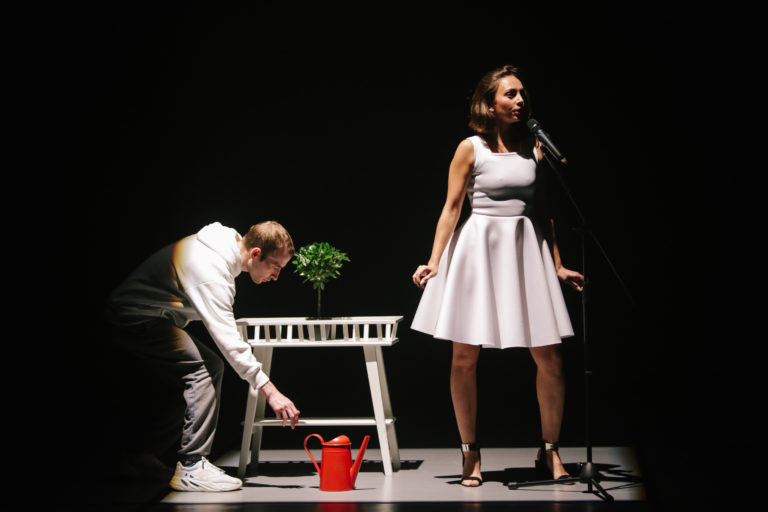
The order of the scenes in the performance is determined by the algorithm. How does it work?
Denis Protopopov
The algorithm for our performance is written in JavaScript — we used it to easily access the play just in a browser window. How it works: three arrays are created in it, and each array contains elements — strings, pieces from the play. In the first play there are 34 such pieces, in the second and in the third — 4 pieces each. Then I wrote some functions. The first one selects 70% of the elements from each array and puts it all in a common large array. And the second function simply shuffles the contents of the shared array and displays a new text on the screen. We used the Math Random method as a randomizer. I also inspired Vanya to learn programming languages, and Vanya made a second algorithm in Python with an array of names of actors and performers. Before each show, we run not only the main algorithm that generates the play, but also the second algorithm — it selects the person who will represent the objects on the bows at the end.
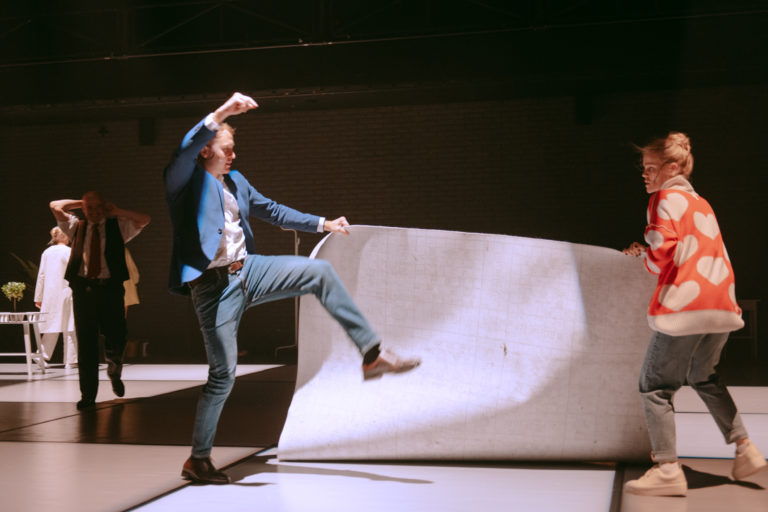
Algorithm, randomizer — why such difficulties at all?
Vanya Demidkin:
In this performance, we work with a sense of the time we are in — a sense of the connection of everything with everything, that all random things are not really random, that everything is mounted with everything in any scenario. How can this principle be implemented in reality? This is where the idea of the algorithm and the design of the performance itself arose as a random sequence of elements that changes every time. Why? Because in the same way our whole reality is changing around, being assembled from a huge number of circumstances, accidents, meetings, relationships, communications. The algorithm is the embodiment of this principle.
But there are additional circumstances. For example, our own interest in watching our own performance and not getting tired of it. If we were doing a classic performance in which there is a beginning, middle and end, then by the fifth show we would already be uninterested to watch, or the eye would be blurred and we could not adequately evaluate our work. So, by the very principle of the performance, we have created such a structure that gives us the opportunity to enjoy this project, watch it as an audience. We love a certain type of theater and want to see it in Russia — and so we staged such a performance and created an opportunity for ourselves to watch it from the outside.
And by the way, this is also an opportunity to bring the performers of the performance out of the state of automatism. They can't just go on stage every month, play and leave, no — it requires a lot of preparation, a lot of responsibility and a conscious approach to each specific show.
By the way, about the artists and the objects on the bows above. Why do you attach such importance to things?
Artem Tomilov:
Simply put, things are equal to people. For us, this is an exercise to feel nonvertical: after all, rockets are about strength, vertical, and treating things as equals is about responsibility and awareness, about another world in general. On the one hand — the monster of capitalism with its overgrowth of things, on the other — things as objects that are here and now with us on an equal footing, and not just a background around. After all, for the one who launches missiles, the enemy is an abstract background that needs to be destroyed, for him the surrounding phenomena are weakened as subjects, that's why the whole experience of the cast gap between everyone.
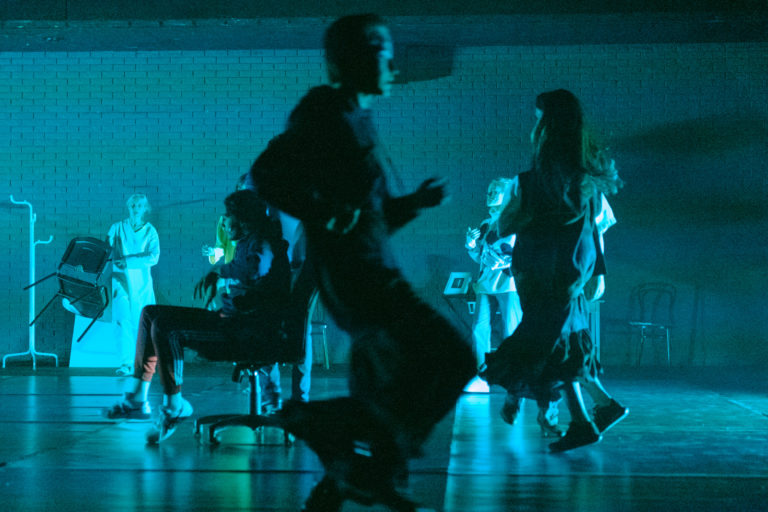
I see a composer in the list of creators. How is the music arranged in the play?
Elina Lebedze:
The music in "Rockets" is also arranged as a constructor: there is a set of sound lines, each of which is attached to a certain repeating detail of the text. Such a solution appeared immediately, even at the sketch stage. I wanted to entrust these lines to live instruments and had already managed to record some of them, but the self-isolation mode violated the plans, I remained locked at home. Then I decided to simply delegate the filling of some lines to the sounds that I would find in my apartment. I walked around the house with a microphone, looking for sounds in everyday objects that would resonate with the plays. It was a very pleasant job, I learned a lot about my things: for example, it turns out that I have a cool candlestick from which you can extract a billion very beautiful rustles and tones.
Another important element of the musical fabric is two live voices. Together with the vocalists of the La Gaul theater, Lera and Katya, we found and came up with different ways of sound production, immediately tried them, and such a mini-laboratory turned out. Before each performance, we reassemble the score from the pieces according to the algorithm, and Katya and Lera sing according to this score.
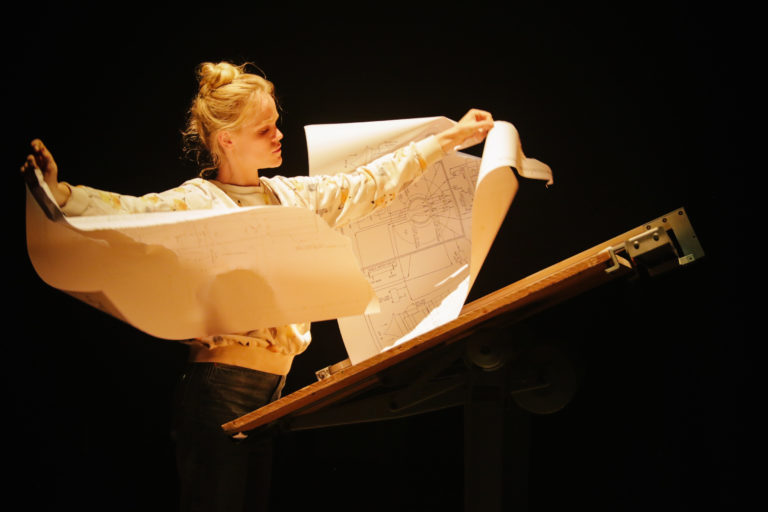
Last question. Where did such a strange name come from, did the neural network also write it?
Vanya Demidkin:
The name "Rockets Take Off and Crash and Scatter in the Air" is a pure coincidence, it appeared on December 15, 2019, the day of the deadline for submitting applications for BlackBox from teams from which projects were selected for pitching in January. Denis and Elina and I came up with our project literally a week before this deadline, and during the week the idea itself was developed, and there was no name until the last moment.
And on the morning of the deadline, I talked to Olya Tarakanova, told her how everything was going on, that we still didn't have a name, and Olya quoted Elena Kovalskaya, who was just telling her: rockets, they don't fly, they take off and scatter in the air. This is about dreams, about how things actually happen, about the fact that the utopian potential of any subject is very different from the final outcome. I thought, damn, that's a great name for a play. We had a laugh, and in the evening I met with Denis and Elina and said — maybe we should call it that? And they're like, come on, nice name! And it so happened that it was from the title that the plays and many other details of the play eventually came out. So the title of our performance rather simply poetizes the principle that things are both what they are and what they could be. This phrase can describe anything on the planet, and it's very cool.